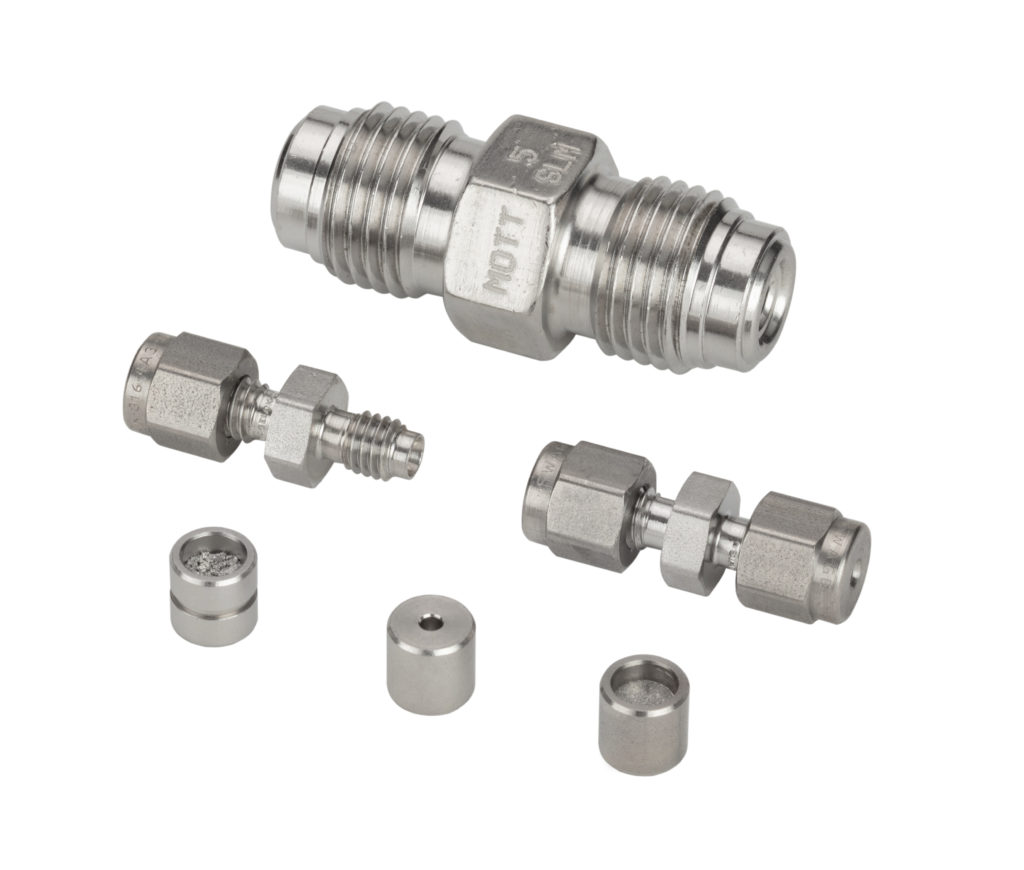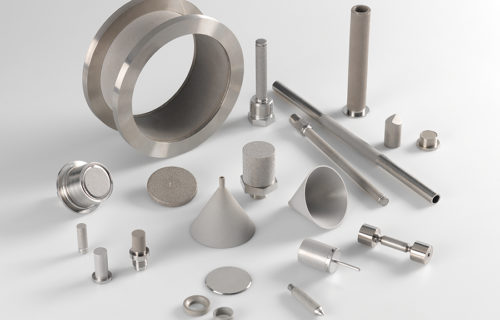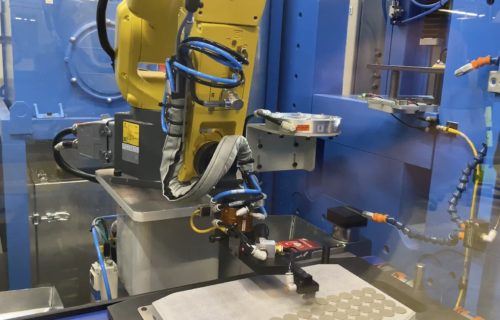Gas Flow Restrictors
Porous metal flow restrictors are essential in applications that demand anti-clogging capabilities or laminar flow. The unique design, featuring thousands of flow paths through the porous metal, effectively prevents the restrictor from clogging if a large particle enters the gas stream. This innovative thousand-pore structure of porous metal flow restrictors ensures laminar flow in even the most intense conditions and eliminates turbulent flow on the outlet, making them highly reliable for critical applications. Moreover, these restrictors are available in a wide variety of alloys and hardware configurations to suit any specific process requirements. Their versatility and efficiency make porous metal flow restrictors an ideal choice for industries seeking precise flow control and durability in their systems.

Questions? Call 860.747.6333 Today!
Literature & Data Sheets
Typical Applications
- Propulsion systems
- Process control & safety
- Leak detection
Flow Restrictors
Overview of customization options and capabilities of Mott flow restrictors
Lab and Engineering Services
Discover our entire range of services, including rapid prototyping, filter feasibility, media characterization and more.
Explore Mott’s Capabilities
Provides an overview of markets served, applications, products, materials, and engineering capabilities.
Product Specs
| Compatible Flow Rates |
Mott can tune restrictors to virtually an infinite number of flow rates. Consult with a Mott representative to procure a flow restrictor that’s right for your process conditions. |
|---|---|
| Flow Accuracy |
Mott restrictors are typically +/- 7.5% of the specified flow rate. Ultra-high accuracy restrictors can be manufactured upon request with accuracies down to 1%. For ultra-low flow rates, broader accuracy ranges may be required. |
| Hardware |
Common hardware – Varying encapsulated sleeves, tube unions, male adapters, and hex nipples are available |
| Materials |
Common alloys – 316L SS, 304 SS, Hastelloy® C-276, Hastelloy® C-22, Hastelloy® X, Monel® 400, Nickel 200, Inconel® 600 Custom alloys available upon request, consult factory |
| Operating Temperatures |
Alloys with temperature resistance up to 1400° degrees Fahrenheit are available. Custom alloys available to accommodate unique operating temperatures, consult factory |
Videos & Articles
Our Design Capabilities
- Application Engineering – Need consultation on your design? Our team of application engineers are ready to help you determine the right part for your design. With decades of experience working with the world’s largest technical and performance brands, we’re eager to solve complex problems with you.
- Customer Innovation Center – We enjoy working with customers on complex projects. In fact, we’ve dedicated an entire facility to it. Want to join us for various lab testing and engineering consultation sessions? Visit our Customer Innovation Center in Connecticut to develop a solution for your unique application.
- Rapid Prototyping Cell – Trying to determine the feasibility of your design as fast as possible? Use our rapid prototyping cell to turn around prototypes in as little as 2 weeks. Our engineers will work with equipment similar to our manufacturing facility to provide you with a manufacturable, economical design.
- Additive Manufacturing – If you’re looking for the most uniform porosity or a non-traditional design, look no further than working with our porous 3D printing team. We can create controlled porosity designs with various density gradients in non-traditional shapes to satisfy the most unique design request. Our technology allows us to print parts with both solid and porous in a single print cycle
Relevant Services
Lab Testing – If you need data packages or feasibility testing for your part prior to installation, we’re happy to work with you. We’ll use our lab center to perform various characterization and performance tests to ensure your parts are meeting strict specifications.
Computational Fluid Dynamics – If you would like to model your process fluids interaction with your Mott requested part, ask your Mott representative how we can model using CFD software.
Engineering Memberships – If you’re constantly working on complex designs that require the highest standards of engineering support, ask about our membership rates, which will allow you discounted rates to various lab testing, prototyping, and engineering resources.
Optimizing Fluid & Gas Control with Porous Metal Flow Restrictors
Mott’s porous metal flow restrictors are engineered to provide unparalleled precision and reliability in controlling fluid flows in a variety of applications. These restrictors leverage the unique properties of porous metal to offer consistent flow rates, prevent clogging, and ensure laminar flow, making them ideal for critical environments where accuracy is paramount. The versatility of these porous metal flow restrictors allows for their use in industries ranging from medical devices to aerospace, where they play a crucial role in maintaining system integrity and performance. With their ability to be customized to specific flow requirements, Mott’s porous metal flow restrictors represent a superior solution for advanced flow control challenges.
FAQs: Porous Metal Flow Restrictors
Q: What are porous metal flow restrictors?
A: Porous metal flow restrictors are precision-engineered components designed to control the flow of gases or liquids through a system. They utilize a porous metal structure to provide consistent, laminar flow while preventing clogging, making them ideal for various applications requiring precise flow regulation.
Q: How do porous metal flow restrictors work?
A: These restrictors work by allowing fluids to pass through a porous metal matrix, which evenly distributes the flow across thousands of tiny channels. This structure ensures a stable, laminar flow and reduces the risk of turbulence and clogging, even in the presence of particulate matter.
Q: What are the benefits of using porous metal flow restrictors?
A: The main benefits include improved flow consistency, reduced risk of clogging, enhanced durability, and the ability to withstand harsh conditions. Their porous nature also allows for integrated filtration, combining flow control and filtering in a single component.
Q: Can porous metal flow restrictors be customized for specific applications?
A: Yes, porous metal flow restrictors can be customized in terms of material, pore size, and geometry to meet specific application requirements. This flexibility allows them to be tailored for optimal performance in various industries, including healthcare, aerospace, and chemical processing.
Q: Where are porous metal flow restrictors typically used?
A: They are widely used in applications that require precise flow control and filtration, such as in medical devices, gas chromatography, fuel cells, and aerospace systems. Their reliability and efficiency make them suitable for critical environments where precise flow management is essential.



